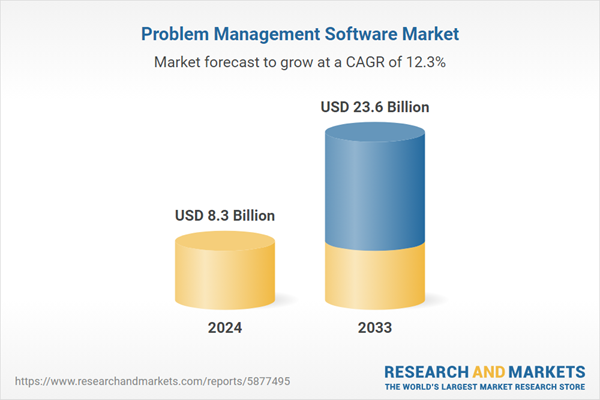Problem management software refers to tools or platforms that help organizations manage and resolve information technology (IT) problems. It provides a systematic approach to tracking, identifying, analyzing, and resolving problems, and helps to prevent them from recurring in the future. Problem management software helps track and log all reported issues or problems, providing a centralized system for recording and documenting incidents. It assists in streamlining the problem-resolution process, reducing downtime, improving service quality, and enhancing customer satisfaction. As a result, it finds extensive applications across the banking, financial services and insurance (BFSI), healthcare, retail, IT and telecom, and manufacturing industries.
Problem Management Software Market Trends:
The increasing demand for automation and optimization of IT processes is one of the key factors favoring the market growth. Problem management software helps to eliminate the risk of inconsistencies, reduce downtime, and improve the quality of problem resolution. In line with this, the widespread software adoption to manage and address issues, such as malfunctions, connectivity problems, or software bugs, is creating a positive outlook for the market. Moreover, the growing incidence of network issues, security breaches, and service disruptions due to the proliferation of digital technologies and the increasing reliance on IT services is contributing to the market growth. Apart from this, the integration of various technologies, such as artificial intelligence (AI), machine learning (ML), and automation to enable more efficient problem identification, analysis, and resolution, is providing an impetus to the market growth. Furthermore, the increasing adoption of problem management software in healthcare organizations to manage and resolve issues related to their IT infrastructure, including servers, networks, databases, and software applications, is positively influencing the market growth. Other factors, including the increasing complexity of IT systems, growing focus on customer satisfaction and experience, extensive research and development (R&D) activities, and rising need for efficient and effective problem resolution and management, are presenting remunerative growth opportunities for the market.Key Market Segmentation:
The publisher provides an analysis of the key trends in each segment of the global problem management software market report, along with forecasts at the global, regional, and country levels from 2025-2033. Our report has categorized the market based on component, deployment type, and industry verticals.Component Insights:
- Software
- Service
Deployment Type Insights:
- On-premises
- Cloud-based
Industry Verticals Insights:
- Banking, Financial Services and Insurance (BFSI)
- HealthCare
- Retail
- IT and Telecom
- Manufacturing
- Others
Regional Insights:
- North America
- United States
- Canada
- Asia Pacific
- China
- Japan
- India
- South Korea
- Australia
- Indonesia
- Others
- Europe
- Germany
- France
- United Kingdom
- Italy
- Spain
- Russia
- Others
- Latin America
- Brazil
- Mexico
- Others
- Middle East and Africa
Competitive Landscape:
The report has also provided a comprehensive analysis of the competitive landscape in the global problem management software market. Detailed profiles of all major companies have been provided. Some of the companies covered include Atlassian Corporation, Freshwork Inc., ServiceNow Inc., Softexpert Software S.A., SolarWinds Worldwide LLC, Sunrise Software Limited, Zendesk Inc., etc. Kindly note that this only represents a partial list of companies, and the complete list has been provided in the report.Key Questions Answered in This Report:
- How has the global problem management software market performed so far, and how will it perform in the coming years?
- What are the drivers, restraints, and opportunities in the global problem management software market?
- What is the impact of each driver, restraint, and opportunity on the global problem management software market?
- What are the key regional markets?
- Which countries represent the most attractive problem management software market?
- What is the breakup of the market based on the component?
- Which is the most attractive component in the problem management software market?
- What is the breakup of the market based on the deployment type?
- Which is the most attractive deployment type in the problem management software market?
- What is the breakup of the market based on the industry verticals?
- Which is the most attractive industry verticals in the problem management software market?
- What is the competitive structure of the global problem management software market?
- Who are the key players/companies in the global problem management software market?
Table of Contents
Companies Mentioned
- Atlassian Corporation
- Freshwork Inc.
- ServiceNow Inc.
- Softexpert Software S.A.
- SolarWinds Worldwide LLC
- Sunrise Software Limited
- Zendesk Inc.
Table Information
| Report Attribute | Details |
|---|---|
| No. of Pages | 141 |
| Published | March 2025 |
| Forecast Period | 2024 - 2033 |
| Estimated Market Value ( USD | $ 8.3 Billion |
| Forecasted Market Value ( USD | $ 23.6 Billion |
| Compound Annual Growth Rate | 12.3% |
| Regions Covered | Global |
| No. of Companies Mentioned | 7 |









